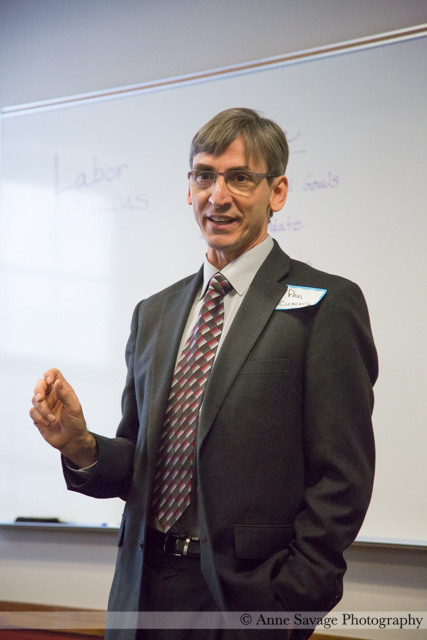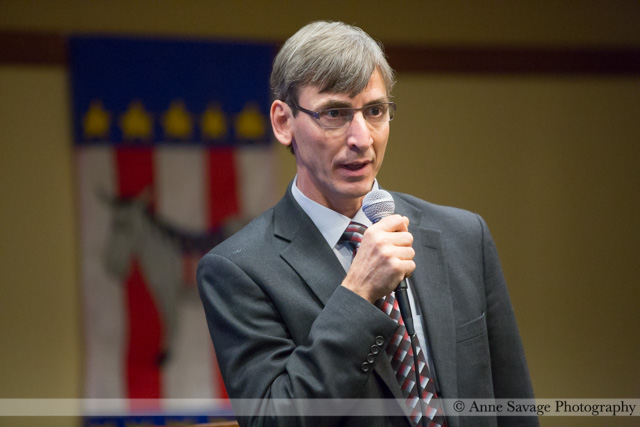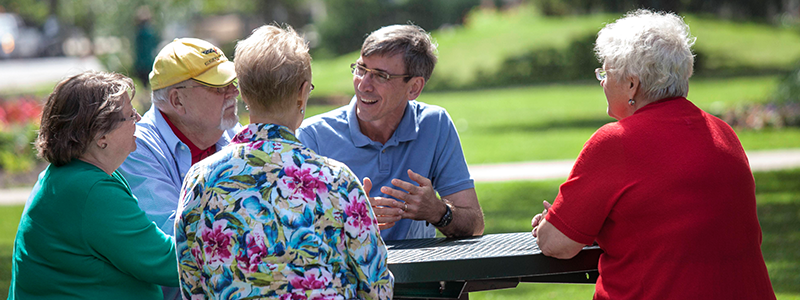I’ve been writing about the race in Michigan’s 6th Congressional District quite a bit lately. Two things have this race stirring up interest. The first is that Professor Paul Clements, the Democrat who is challenging Fred Upton for this seat, has been running a race that’s far more competitive than any previous Democrat has run. He’s raised more money and he has had more ads on television. In nearly every way he’s running an unprecedented Democratic campaign in MI-06.
The second reason is that the citizen-funded MaydayPAC selected this race as one of its priorities and has committed to spending $1.5 million to defeat Upton, a Republican that receives an astonishing amount of money from special interest groups to whom he is beholden. This sort of investment has the potential to be a game changer and clearly has Upton spooked.
Earlier this week I talked with Paul Clements about this race and his chances for unseating the powerful Chair of the House Energy and Commerce Committee.
You can learn more about Clements’ campaign at his website HERE and his Facebook page HERE.
Let’s start out with a little bit of background. How long have you been in Michigan, what are your qualifications, how did you end up running for Congress in the 6th District?
 I’ve lived in Michigan for 18 years. I arrived here directly from my graduate studies at Princeton. I’ve been teaching national economic development here at Western Michigan University since then. I helped to start an evaluation doctoral program and I teach program evaluation.
I’ve lived in Michigan for 18 years. I arrived here directly from my graduate studies at Princeton. I’ve been teaching national economic development here at Western Michigan University since then. I helped to start an evaluation doctoral program and I teach program evaluation.
I was born in Texas but I grew up mostly in Hong Kong and India. My dad was a social worker with the Methodist Church. He was working with refugees coming out of China and from the slums of Bombay and villages in India for economic and social development. So, that was my experience through high school.
I did my undergrad at Harvard and then joined the Peace Corp. I was a Peace Corp volunteer in West Africa in the Gambia area, a little ways north of where the Ebola trouble is taking place these days. I stayed for five years in Gambia working with a British nonprofit on different development operations there.
Finally, I did my graduate studies in public affairs at Princeton.
I’m running because our Congress isn’t working and Congressman Upton has really become part of the problem. He used to be a moderate but, on a whole variety of issues from family planning to abortion to student loans to senior services, he’s moved from being a moderate to being a real extreme hardliner.
That has been a really noticeable shift, actually.
Yeah, that’s right. When I’m talking with people around the district, they’re telling me every day that he’s changed. It’s not an argument that I have to make!
And he’s a powerful guy, right? He’s the Chair of the House Energy and Commerce Committee.
Yes, that’s right. He had been moving to the right for quite some time but it does seem that with that chairmanship, that he’s gone along with his party’s leadership much more consistently since then. The issue that got me looking at this was, I published and lectured on climate change and he used to say we need to control greenhouse gases but, since he got that chairmanship, he did a complete turnaround. Now he says he’s not convinced that it’s caused by humans and he’s really tried to put a block on any action on climate change which is really harmful because the president needs Congressional support if he’s going to take leadership internationally. We need that strong world leadership but he’s blocked from that by my Congressman.
That was the thing that convinced me to run against him.
One of the issues that you seem to have taken a leadership role on is money in politics. How is that evolved and what does that involve in terms of your position?
Well, I’ve been saying from the very beginning, and this is on the record, that money in politics is the biggest threat to our democracy. That’s everything from campaign contributions to the outside power of particularly wealthy corporations and wealthy individuals with lobbyists influencing legislation as it’s going through. If we want democracy to serve the interests of the people, then it’s got to be our votes, it’s got to be the majority that is what matters. The role of money has been really threatening and undermining to that.
You’re now getting some assistance in your race from MaydayPAC. How does that fit in with the perspective that you just shared?
I am really proud that they picked my race to support. I think there are two sides to that. One is that I’ve been saying all along that Upton’s changed and he’s been influenced, partly by money but also by power. He’s one of 55 people in the House and Senate who get over half of their contributions from out of their home state. Fred Upton actually gets over 60% from outside Michigan and over 60% comes from PACs. He’s gotten over $600,000 from oil and gas companies and he’s voted for major tax breaks for these companies. So this is really a concern.
I’ve been pushing also for campaign finance reform. The Mayday group is representing 60,000 people who want our democracy to work better for our citizens and who are concerned about the role of Big Money in subverting that. For them to pick my opponent as someone to go against and for them to pick my race to support, I’m really proud of that.
I asked that question because I think it’s important that people understand that this isn’t an ordinary PAC. This is something considerably different.
Upton gets 60% of his funding from PACs but their PACs are groups who want tax breaks for their supporters, some specific policy that’s going to help their interests. Here is a PAC that wants democracy to work better for the people.

That’s awesome, at least until we can get campaign finance reform. In terms of campaign finance reform, there are several philosophies on how that should happen, whether it’s a constitutional amendment or whether Congress acts and changes our laws. Where do you come down on that particular discussion?
I’m kind of “all of the above”. I think that there are a lot of different proposal out there and we probably need to have action on several different fronts. I’d love to see a constitutional amendment but we all know that they take time so, if it’s going to be a while before we can get that, then I think Congress should be taking whatever action it can short of that to make sure that, with regard to contributions, people know who is giving to what. Transparency and accountability are fundamental to democracy and if you don’t know whose spending to win elections then you don’t have that.
When the people who are benefiting from that largesse of corporate America and wealthy individuals are the ones who have to enact that kind of change, how do you make that happen in that context?
Certainly, as I’ve gone around and talked to people and just watching the news, I think there’s a very widespread perception that Citizens United was just a bad decision by the Supreme Court. So I do think that we’ve got a real chance to get a constitutional amendment eventually. But, realistically, these sorts of things don’t happen overnight.
In terms of moving toward campaign finance reform, again, what percent of Americans think Congress is working? What percentage of Americans think that the role of Big Money is not hurting democracy? Everyone thinks that. Pretty much everbody does. So, I appreciate that it takes work but I think it’s plausible that it could move forward.
So you think it needs to bubble up from voters putting pressure on their legislators to make that happen?
Sure. Certainly it does.
I agree with that. I love what Move to Amend is doing but I also love what some of the other groups are doing in terms of trying to make things happen a little sooner than that and I really do think that it’s going to have to be a citizens’ motivated and driven approach to this. And I don’t think that a lot of legislators, and I put a lot of Democrats in that category, as well, are going to do it on their own unless there are people like you with a real fire in their belly for it.
Sure, and we remember things like what Obama said about things like climate change. He said, “Now that I’m president, you’ve got to push me to do this.” Because he needs to have support.
The 6th District is seen widely across the state as a VERY conservative district. But, when you look at the numbers, it’s got a Cook Partisan Voting Index of only R+1. Upton didn’t do particularly well in his last election, or at least he did a lot worse than people thought he would do. What’s your lay of the land there? Do you think that a Democrat can win the 6th District?
Yeah, I do. It’s like you said, it’s actually the bluest district in Michigan with a Republican Representative in the House in terms of the Cook PVI. Barack Obama got 53% in here in ’08. He didn’t even campaign here. He had virtually zero operation in ’12 because he took Michigan for granted; appropriately since he won by a good margin. But he still got 49%. Debbie Stabenow won the district. The district has been gradually become a little more progressive and Upton’s been moving to the extreme right. And he hasn’t faced a Democratic challenger who’s been able to run a national standard campaign and we really have done that.
How have you done that? Is it that you’ve brought on the right people to make that happen or do you yourself have experience running a campaign of this caliber or something else?
This is my first time running for office but I did start early. I filed with the Federal Election Commission in January of last year so I’ve been working on this for almost two years. I’m a political science professor so I kinda had some idea about what I was getting into! But, during the whole learning curve I got some good consulting advice early on and then I got a really good campaign manager and I’ve talked to the local Democrats here, people who have run for a variety of offices. For Congress, for local offices. And I’ve had really good counsel and support here in the district. And then just starting early and building a strong campaign.
You’ve probably heard that we’re well over twice the former record for Democratic fundraising in the district. Because I started very early, I’ve heard from many groups in each of the six counties in the district and I’ve got very strong support from individuals and groups in all six counties. So, as we move the get out the vote program, we’ve got a really excellent program. We’re using Obama-style technology for that. The Progressive Change Campaign Committee has been supporting me and they’ve given me really good advice and technological support for getting out the vote. In many ways we’re building a stronger campaign. And this was before the Mayday help. That points out that Upton is one of the most “corrupted by Big Money politicians” in Congress.
Well, that’s very evident. When certain votes come up – or don’t come up – in front of Upton’s committee, it’s very clear why that happens.
So, you’re fundraising is strong. And you’ve been running ads, right? You’ve got three ads? Four ads now?
We’ve got four ads that have been running for about 11 weeks so far. Whereas, before now, Mike O’Brien, who ran in 2012, he ran two weeks of ads. And, before that, zero. So, this is a pretty significant change.
And these are running in the television markets on the west side of the state?
They’re running out of Grand Rapids and South Bend and that covers almost the entire district.
What are your plans when you get to Congress? What would be your top priorities when you get there?
In terms of where I want to be going, I am concerned, as we have been discussing, that our democracy is not working for the people and that we’re seeing increasing income inequality. We’re seeing increasing economic growth but the benefits are pretty much going to the top 10%. Look, I teach economic development. I know that you need to have strong growth but growth that includes the middle class. Inclusive growth. That’s a big priority.

Courtesy photo
I certainly want environmental sustainability and climate change is clearly the biggest challenge there. So, I’m going to be a leader on that.
Besides the economy and the environment, the third area where I think our country needs to substantially improve is education. This is partly for the economy because we’re not training for the jobs that are going to be there. But it’s also just for our democracy in society. Here in Kalamazoo we have the Kalamazoo Promise which is wonderful. It means that anyone who goes through public schools can get free tuition to any state college or any state university. And now they’ve expanded it even to private colleges. But we still have kids in Kalamazoo who won’t graduate from high school because they don’t have the foundation that they need. And that’s a problem.
There are a lot of specific programs there but I would push for the federal government push hard for universal access to good quality preschool. Upton voted for the biggest increase, in fact, he voted to double the interest rates on student loans. He voted for the biggest cut in federal student aid in history. I’m going to push to increase student loan programs and to decrease the interest rates on student loans.
We also, as a country compared to other countries, we substantially under-invest in vocational training and in retraining people when they become unemployed, for the jobs that business needs, the jobs that are out there. I think the government has a significant roll in strengthening vocational education and in training programs for people after they become unemployed.
Any final thoughts before we wrap this up?
One thing that people forget is that Fred Upton was on the so-called “Super Committee”, the Congressional budget committee. He was one of six Republicans, there were also six Democrats. During that process he wasn’t prepared to compromise so we went two years without a budget and with sequestration which a sort of meat cleaver approach to budgeting. He was one of the people who said that it would be a mistake to shut down the federal government over the Affordable Care Act. And then he voted for shutting down the government over the Affordable Care Act! In a whole variety of ways he moved with his party to the extremes and that’s why our Congress isn’t working. That’s why we’re not in a position to address, not just the big issues like education and the economy and the environment, the really big issues, we’re not even able to fix our roads. We’re not even able to do the basic things that government ought to be doing. That’s got to change.
UPDATE: Just for fun, here are coupla dudes with a message about the MI-06 race:
[First two photos by Anne C. Savage, special to Eclectablog]



